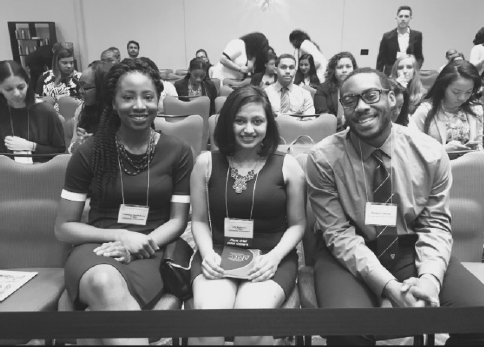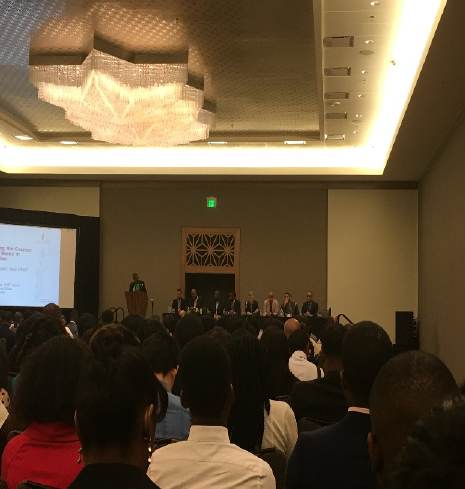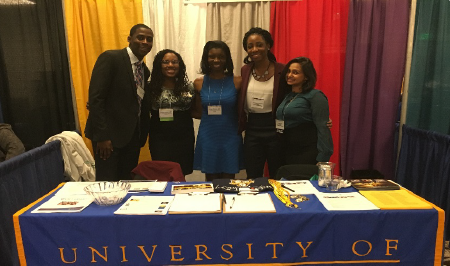by Funmi Ogunbufunmi, Class of 2018
The Annual Medical Education Conference (AMEC) hosted by the Student National Medical Association is an educational program that provides young aspiring doctors with connections, information, skills, and potential mentors through interactive workshops, seminars, and social events. The purpose of AMEC is to equip members at all stages of their education—from those just completing their freshman year of college to those who are preparing for life beyond medical school—with the necessary tools to be successful.
AMEC was held in Austin, Texas this year, and the theme was mental health. Mental health is a unique illness that not only needs to be further understood and studied within patient populations, but also needs to be addressed in the health of physicians and family members of patients. AMEC afforded the members within the University of Rochester Chapter of the Minority Association of Pre-Medical Students (MAPS) with growth and knowledge that will be used to make our community ever better.

Thursday
The 2016 AMEC was filled with phenomenal workshops, exhibits, networking receptions, and luncheons. And just on the first day! The events were tailored to specific populations, but all programs were open for any who thought they’d benefit from attending. A standout pre-med-tailored workshop was “Financing Medical School.” MAPS members learned about the various private scholarships and government programs that allocate big dollars for minority students who plan to attend medical school.
Another workshop that stole the spotlight was “Unnatural Causes: How Cultural Competency Makes a Difference.” With growing minority populations, it is imperative that future physicians intimately understand the populations they will serve. This workshop highlighted how harvesting the growth of healthcare providers who are socially conscious and aware will be immensely beneficial to the health care system as a whole. Day one of workshops was a huge success!

Friday
After getting all dapper the next morning, the crew ventured onward for another fulfilling day! The highlight of the second day was the pre-med recruitment fair. Dozens of medical school representatives attended to make their case for why their medical school should be a top choice for pre-med students. The MAPS members established connections and gained insight into the each school. It was during this exhibit that many pre-med students learned that no two medical schools are alike. Attending the recruitment fair was beyond beneficial in terms of getting a better idea of which medical school would be the right fit!

Saturday
The final day of AMEC was bittersweet. Additional workshops and networking receptions were held to ensure that all attendees left with the necessary knowledge and resources that all successful students in medicine have. These workshops ranged from a panel of deans of medical admissions to understanding the contrasts between osteopathic and allopathic medicine. More workshops were also held to promote the necessity of understanding the economic, mental, and physical challenges faced in minority communities.
In addition, MAPS chapters from various institutions within region IX (the northeast region of the national organization) convened to elect the new executive board members of the Student National Medical Association (SNMA), which is the parent organization of MAPS.
Later that evening, the hundreds of attendees gathered for the final ceremony, the annual Gala. The great Dr. Damon Tweedy attended the extravagant evening and recalled his experiences of overcoming hardship in medical school and residency. He also narrated the moments in his life leading up to the release of his critically acclaimed book, Black Man in a White Coat.
AMEC capped off with region coordinators recognizing the hardworking MAPS chapters of their region before the new executive board members were sworn into duty. Attendees bid farewell, gave warm hugs, and swapped last-minute contact info before they all returned to their respective institutions. Equipped with newfound knowledge and resources, all attendees went home with something more than they had before.
Looking Back
When I think of my time at AMEC, I have a wide range of emotions that I will feel for many years. The most prominent feeling is a profound sense of inspiration. As a student of color coming from a low socioeconomic setting, my pursuit of medicine at times appeared too insurmountable. Only after the conference did I realize that I was not the only one who believed my dreams would be expunged from fruition.
I lose count keeping track of all the adversity-filled journeys the many successful physicians and medical students narrated. These stories were invariably riddled with tribulations that at some point seemed insurmountable as well. These venerable health professionals and medical students carved a path to their goals through faith, hard work, and consistency. I no longer question my ability to follow through with my aspirations, no matter how difficult or implausible achieving them might seem. I often find myself reflecting back to the wise words of Dr. Damon Tweedy who stated, “Choose to see the opportunity in every difficulty, not the difficulty in every opportunity.”
Not only have I been inspired after attending AMEC, but I have also been endowed with a sincere sense of responsibility. Underserved communities similar to the one I call home deserve to have higher quality healthcare and better health outcomes. During the opening ceremony of AMEC, Dr. Bill Lawson recounted numerous studies that detailed the many undiagnosed mental disorders that plague low-income communities. He gathered that if mental health was destigmatized, barriers that prevent people from obtaining quality and timely care will eventually dissipate.
I realized the best way for this vision to come true is to develop the necessary repertoire of skills that can serve the countless underprivileged communities around the nation. Not only will my actions improve the quality of life of those who have been marginalized through healthcare, but I may also inspire the next generation of healthcare providers to serve the same demographic I intend to reach.
Above all else, as I move through my journey in medicine and occasionally ponder my cherished experience, I will always have an intense feeling of belonging. AMEC bequeathed me with inspiration and responsibility, but more importantly, I was blessed with an extended family. The most wondrous part of AMEC was that it brought people at different stages in their journey together for a moment of fellowship and outreach.
At its core, AMEC was a time where one person can give their knowledge and resources to another in the hopes that someone’s journey through medicine will be a smoother and more fulfilling one until the following year where the same is done again.

